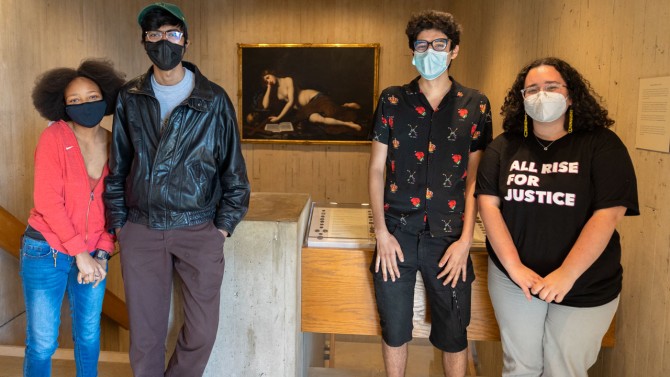Through the RAD Public History Fellowship, six undergraduates work with curators, librarians and archivists in Cornell University Library’s Rare and Distinctive Collections (RAD), gaining hands-on training in public history, archival theory, curation, stewardship and education. The program culminates in a day of presentations on May 6.
Student-librarian partnership makes history
By Jose Beduya
Throughout the spring semester, the inaugural RAD Public History Fellows have been digging deep into library archives and bringing their discoveries to light in creative ways – from social media posts to displays of artifacts and tours of library exhibits.
Cornell University Library and the Cornell Public History Initiative (PHI) launched the fellowship for undergraduate students in January, pairing them with curators and archivists in the library’s rare and distinctive (RAD) collections as they engage in hands-on research and curatorial work.
“Partnering with the Public History Initiative has made it possible to open up the working life of the library to a new generation of public historians with different perspectives, experiences and courses of study at Cornell,” said Joan Lubin, the director of research, education and engagement of RAD collections, who is leading the fellowship program with Stephen Vider, assistant professor of history and director of the PHI in the College of Arts and Sciences.
“The PHI is dedicated to creating new pathways for students to think about how historical knowledge is produced,” Vider said. “This new partnership with RAD not only provides students a critical opportunity to learn about archival practices first hand. It also provides a space for students to engage with larger ethical questions about power and access that shape those practices and determine whose stories get preserved and shared.”
Apart from one-on-one mentorship, the fellows have been meeting as a group to discuss critical readings and to participate in workshops and presentations by curators and archivists from different parts of the library and across campus. This included joining a session led by guest conservators at the Herbert F. Johnson Museum of Art as part of its undergraduate Museum Training Program.
The RAD Public History Fellows, their library mentors and their projects are:
- Tavo Duarte ’23 (anthropology, A&S), with Steven Calco, research archivist for the Kheel Center for Labor-Management Documentation and Archives, in promoting the center’s labor union collections and the exhibit “The Other Side of the Tracks: Discrimination and Social Mobility in the Railroad Industry.”
- Laura Chang ’23 (anthropology and biological sciences, A&S), with Dan McKee, Japanese bibliographer at Kroch Library Asia Collections, in cataloging and creating finding aids for the donated private collection of a local martial arts instructor, and gathering materials for a future exhibit.
- Emily Vo ’25 (computer science, A&S), with Emily Zinger, Southeast Asia digital librarian at Kroch Library Asia Collections, in enhancing the discoverability and accessibility of collections in the Southeast Asia Digital Library.
- Javed Jokhai ’24 (College Scholar, studying the intersection between politics, secularism and Islam, A&S), with Amelia Kallaher, data literacy librarian at Mann Library, in increasing the visibility and accessibility of underutilized digital collections related to agricultural science, life sciences and human ecology.
- Claudia León ’23 (American studies, A&S), with Marcie Farwell, the Gordon and Marjorie Osborne Textile Industry Curator in the Kheel Center, in creating a display case about imprisoned labor in textile and garment manufacturing to be shown as part of the exhibit “Social Fabric: Land, Labor, and the World the Textile Industry Created” at Rare and Manuscript Collections in October.
- Finley Williams ’25 (American studies, A&S), with Brenda Marston, curator of the Cornell Human Sexuality Collection, in promoting the exhibit “Radical Desire: Making On Our Backs Magazine.”
For Williams, working with Cornell Human Sexuality Collection has helped her affirm her identity and gain a sense of community. She has led tours for the “Radical Desire” exhibit for small groups, including her peers at the Loving House, an on-campus residential space for LGBTQ students.
At first, Williams felt anxious and unprepared to lead the tours.
“I think the key was realizing that my perspective as a queer woman of color could enhance the tour for the visitors,” she said.
“I was excited about and had personally connected to the exhibit, and I was able to share that genuine excitement with the visitors,” she said. “This, combined with information I had learned from being in the exhibit myself and watching Brenda do tours, created a perfect mix of emotion and factual detail, which made it much easier for me to lead the tours.”
For León, the fellowship is an extension of her passion for education and social justice.
The prison labor display is very relevant today, she said. “We’re still grappling with issues of imprisoned people’s labor rights.”
“I’m really interested in creating history and how to incorporate marginalized voices, and then making something physical like an exhibition of a case of artifacts,” León said. “I think that’s a great way to bring in people who otherwise wouldn’t be interested in, say, reading long, dense academic texts.”
Farwell, León’s mentor, describes their collaboration as mutually enlightening.
“We’ve both been doing a lot of research on prison labor, and it’s interesting to find out what Claudia’s thinking about it versus what I’m thinking about it,” she said. “And then we try to find visually interesting objects that allow her to tell the story.”
The RAD Public History Fellowship will culminate in a virtual presentation of student projects on May 6, 1:30 to 3:30 p.m. This RAD Public History Fellows Symposium is free and open to the public.
Jose Beduya is staff writer, editor and social media coordinator for Cornell University Library.
Media Contact
Get Cornell news delivered right to your inbox.
Subscribe

